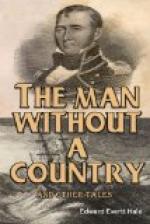“It is the intention of the Government that he shall never again see the country which he has disowned. Before the end of your cruise you will receive orders which will give effect to this intention.
“Respectfully yours,
“W. Southard, for the Secretary of the Navy.”
If I had only preserved the whole of this paper, there would be no break in the beginning of my sketch of this story. For Captain Shaw, if it were he, handed it to his successor in the charge, and he to his, and I suppose the commander of the Levant has it to-day as his authority for keeping this man in this mild custody.
The rule adopted on board the ships on which I have met “the man without a country” was, I think, transmitted from the beginning. No mess liked to have him permanently, because his presence cut off all talk of home or of the prospect of return, of politics or letters, of peace or of war,—cut off more than half the talk men liked to have at sea. But it was always thought too hard that he should never meet the rest of us, except to touch hats, and we finally sank into one system. He was not permitted to talk with the men, unless an officer was by. With officers he had unrestrained intercourse, as far as they and he chose. But he grew shy, though he had favorites: I was one. Then the captain always asked him to dinner on Monday. Every mess in succession took up the invitation in its turn. According to the size of the ship, you had him at your mess more or less often at dinner. His breakfast he ate in his own state-room,—he always had a state-room,—which was where a sentinel or somebody on the watch could see the door. And whatever else he ate or drank, he ate or drank alone. Sometimes, when the marines or sailors had any special jollification, they were permitted to invite “Plain-Buttons,” as they called him. Then Nolan was sent with some officer, and the men were forbidden to speak of home while he was there. I believe the theory that the sight of his punishment did them good. They called him “Plain-Buttons,” because, while he always chose to wear a regulation army-uniform, he was not permitted to wear the army-button, for the reason that it bore either the initials or the insignia of the country he had disowned.
I remember, soon after I joined the navy, I was on shore with some of the older officers from our ship and from the Brandywine, which we had met at Alexandria. We had leave to make a party and go up to Cairo and the Pyramids. As we jogged along (you went on donkeys then), some of the gentlemen (we boys called them “Dons,” but the phrase was long since changed) fell to talking about Nolan, and some one told the system which was adopted from the first about his books and other reading. As he was almost




